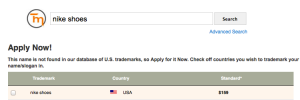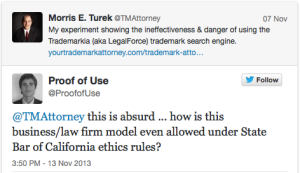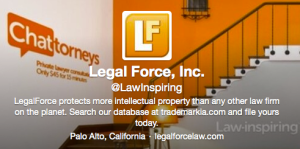Trademarkia … How Do You Justify That?
Morris Turek, a trademark attorney in St. Louis, Missouri, recently posted an article on his blog at “YourTrademarkAttorney.com” (that’s his “Your” not my “Your” and not necessarily your “Your”) reporting on his “experiment” with the Legal Force Trademarkia (or “Trademarkia”) search engine.
The gist … if a search does not cover a prior USPTO filing for an identical mark or encompass identical terms then Trademarkia will prompt you to “Apply for it Now” – here’s a screenshot of the search result for NIKE SHOES:
Likewise, a search for “McDonald’s Burgers” yields numerous results showing filings that contain or encompass those word elements … but take away the apostrophe (“McDonalds Burgers”) and the search fails:
The same occurs with a misspelling of STARBUCKS as “Starbuks”:
Most laypersons with a rudimentary understanding of business and commerce know that NIKE SHOES, MCDONALDS BURGERS and STARBUKS are not available trademarks and filing a USPTO trademark application would be a waste of money. But these are the obvious examples. The real problem is most trademark searches are done for legitimate purposes for terms and words that are not always so obviously unavailable. Trademarkia has a twisted and faulty view of pre-filing trademark clearance. Its results are black and white and trademark law is all gray. The standard for reviewing marks is whether they are “confusingly similar” not identical. There are subtleties and subjectivity and meanings and impressions … all of the stuff that fits into the gray area but not Trademarkia’s search algorithm.
How could Trademarkia steer its users into spending money on a fatal trademark application?
Legal Force Trademarkia states on its website that its “mission” is “[t]o be the world’s largest and finest online legal technology platform” to “facilitate … trademark processes” and “streamline, and simplify processes related to trademarks.”
Mission aborted!
This is simply not possible — and never will be — when Trademarkia users are directed to apply for trademarks that (1) are obviously not available for registration, (2) waste money and resources, and (3) subject them to lawsuits and claims of trademark infringement.
Absurd, isn’t it?
I thought so … so I sent Morris the following tweet:
A few hours later “LF Trademarkia” (@Trademarkia) started “Following Me” on Twitter.
And a few days after that I was informed by a client that it received an unsolicited email from “Trademarkia.com” regarding its approaching deadline to respond to a USPTO office action. My client was so confused by the wording in the “Trademarkia.com” correspondence that it thought the email was from the USPTO. Apparently others have been similarly confused.
So now, not only is their search engine dangerously ineffective, as Morris exposed, but they’re trying to poach my client? A client whose trademark application clearly lists “Me” as “attorney of record” and “correspondent of record.” I decided to send them an email. Here’s our exchange (edited for brevity):
ME: It is highly unethical for you to be sending correspondence to my clients. I am the listed attorney of record. Do not do this again.
Trademarkia: This is a commercial, public-service notice and advertisement in compliance with federal and state laws. This is an automatic, machine generated email and not a substitute for the counsel of a lawyer. Recipients of this email should consult with a licensed attorney for legal advice. You can quickly opt out of receiving any notices like this one in the future by clicking this link: *Unsubscribe*
ME: My client never subscribed or “opted in” to your service. How do you justify that?
Trademarkia: We are a private company that assists applicants in their business with the United States Patent and Trademark Office (USPTO). To make this easier, we send out helpful reminders to all applicants who have filed with the USPTO (by way of communication with their listed Correspondent), regardless of whether we’ve worked with them directly.
ME: You are a law firm and you are having direct contact with my client who is listed as having an attorney of record with the USPTO. How do you justify that?
Trademarkia: We are not a law firm, Legal Force Trademarkia assists with the trademark application process. We have an affiliate law firm that only our clients deal with.
ME: What’s the name of the “affiliate law firm”?
They never responded to my last email. But they did immediately “unfollow” me on Twitter.
Doesn’t matter … I think I know the answer to my last question. I hesitate to say “I know” the answer because there are so many potentially affiliated entities that it’s hard to know for sure who their clients “deal with” — among them:
- “Legal Force, Inc.” as shown on their Twitter profile (@LawInspiring):
- The old standby and all-encompassing “Trademarkia, Inc.”
- There’s also the less catchy “Legal Force RAPC Worldwide P.C.” which is the name they currently favor (without the “P.C.”): www.legalforcelaw.com
Note that both Legal Force RAPC Worldwide and Legal Force Trademarkia use identical wording (“Legal Force”) and the same “LF” Logo in the same orangey hue. The first link and word appearing at the top of the Legal Force RAPC Worldwide website is … “Trademarkia” … and it’s right above the wording “Legal Force” and the “LF” Logo. They also share the same “LF” Logo on their Twitter profiles, websites and elsewhere – here’s the Legal Force Trademarkia Twitter profile:
“Law-inspiring”? … or confusing?
Now, if a basic tenet of trademark law is that marks function as source indicators and if both LEGAL FORCE TRADEMARKIA and LEGAL FORCE RAPC WORLDWIDE use the same marks, names and logos then surely they must point to the same source.
And they do.
Unless Trademarkia says they don’t.
It’s ironic that both companies – who are in the business of avoiding consumer confusion – create so much … well, confusion.
It gets worse.
Legal Force Trademarkia Terms of Service state the following:
“I understand that the Trademarkia.com website and search engine was created by the law firm Raj Abhyanker P.C. in Mountain View, California but is a separate business from the law firm.”
“I fully understand that Trademarkia.com is not a law firm, and that Trademarkia.com does not earn money from any legal services, in whole or in part. I fully understand that Trademarkia.com cannot and does not provide any legal services or legal advice.”
“I understand that if I decide to file a trademark application in the United States, I will be represented solely by U.S. licensed attorneys at the law firm of Raj Abhyanker P.C. after a successful conflict check.”
And here’s the kicker:
“I understand that only one law firm is invited to advertise on Trademarkia.com in each country, and that Raj Abhyanker P.C. is the exclusive advertiser on Trademarkia.com in the United States.”
Wait a minute … I don’t understand … where did Legal Force RAPC Worldwide P.C. go? And where did Raj Abhyanker P.C. come from?
Raj Abhyanker is the co-founder and CEO of Legal Force Trademarkia and founding partner of Raj Abhyanker P.C. and Legal Force RAPC Worldwide. He is a self-described “patent attorney” (…but lets not go there) and ultimately the man behind the Trademarkia curtain.
His law firm Raj Abhyanker P.C. has an “exclusive” referral “advertising” agreement with Trademarkia.com in the United States. Sweet deal! Here’s the link to Legal Force Trademarkia “advertisers”.
Notice when you click on Raj Abhyanker P.C.‘s web address <www.rajpatent.com> you are re-directed to the Legal Force RAPC Worldwide website.
Why do they do that? And I find no mention of Raj Abhyanker P.C. on the Legal Force RAPC Worldwide website.
What does seem clear to me is that Trademarkia — in all its names and forms — functions as an exclusive referral funnel for Raj Abhyanker’s legal services — in all its names and forms.
All of which takes me back to my original question tweeted to Morris:
“how is this business/law firm model even allowed under State Bar of California ethics rules?”
The answer … I don’t know.
They’ve been around long enough that one would think this would have been sorted out by now. Anyway, who am I to question Trademarkia’s legal ethics when Raj Abhyanker himself has given a presentation on “Legal Ethics in the Age of the Internet” at Stanford Law School.
I’ve met Raj – at one of the INTA Annual Meetings – back when Legal Force RAPC Worldwide P.C. was known simply as Trademarkia … or at least that’s what I thought. He seemed like a reasonable guy. So I would like to make a reasonable proposal:
- stick to the pro se applicants; and
- applicants listed as having an “attorney of record” are off-limits.
I’m not asking for professional responsibility just a little professional courtesy.
It’s not as if Legal Force RAPC Worldwide P.C. needs to poach my clients or anyone’s clients. In the following video clip from a different Stanford Law School presentation Raj explains that his legal business is on pace to have collectively filed more than 21,000 trademark applications … more than “any other law firm in the history of the United States” (see @ around 3:10).
He adds: “we’re adding 700-900 clients a month to our law firm that backs this business” (see @ around 3:30).
They also plan on opening “retail stores” and looking to “franchise the concept to lawyers across the country.”
Law-inspiring.
At around the 6:10 mark in the video – something revealing happens – someone in the audience says “pardon my ignorance here but … so having a retail presence … is that going to put you perhaps in the space of being like a law firm?”
And Raj’s answer: “we are a law firm”
She had no idea … and that was after his presentation had ended.
Understand?
With all the eye-popping numbers and millions of dollars and mission statements and dreams of global Trademarkia dominance — there’s just way too much confusion. A search on Legal Force Trademarkia still suggests the following trademarks are available:
“Legal Force Trademarkia” “Trademarkia Search Engine” “Legal Force Law”… and that I, not Raj, should “Apply Now” to register the trademarks.
But I wouldn’t do that – I know better.






